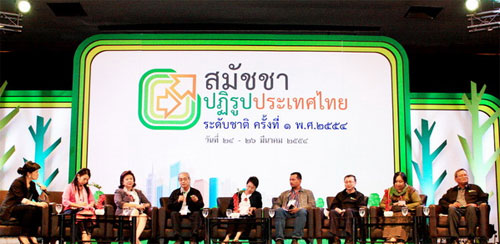Eight proposals formulated in the 1st National Reform Assembly were submitted to Prof. Dr. Prawase Wasi, chairperson of the National Reform Assembly Committee and Mr. Anand Panyarachun, chairperson of the National Reform Committee on 26th March, 2011. The 8 proposals include:

1. Fair and sustainable land allocation with ownership limited to 20 rais or 8 acres.
2. Management of sea and coastal resources
3. Return of justice on land and resources, reform of judiciary system on cases about land and resources ownership.
4. Reform of social security system in which the independent mechanism is in place and benefiters can directly elect their representatives.
5. Security and promotion of wellbeing for senior citizens
6. Mechanism for happy society and potential development fund for the vulnerable groups
7. Decentralization of power according to the 3rd National Health Assembly’s resolution on development of self-management area.
8. Formulation and implementation of the culture development plan as a way to build creativity and heal society
Established in 2010, the two Reform Committees with the 3-year term were set up as the result of recent political uncertainty in Thailand. Prime Minister Abhisit Vejjajiva’s government appointed two panels: the National Reform Committee chaired by Mr. Anand Panyarachun and the National Reform Assembly Committee chaired by Prof.Dr. Prawase Wasi.
Mr. Anand Panyarachun stated after getting consensus, the reform resolutions are now pushed forward to the government or political parties’ consideration for further policy-making. Nonetheless, this will be proposed to the government before the committee’s resignation as the NRC was set up by the present government. After the election, the new government should decide on the committee’s future.
Prof.Dr. Prawase Wasi said that National Reform Assembly processes needs continual mobilization, as well as analyses, syntheses and follow-up. Such processes are new and different from the existing concepts, which involve only 2 kinds of powers: state and money. The two powers lead us to conflicts and violence as they concerns contestation.
On the other hand, National Reform Assembly processes depend greatly on power of civil society that bestrides over conflicts and creates social harmony. This is social management done in harmony, by civil society, to make the impossible possible.
These reform processes have to be done in cycle, like the Buddhist wheel, and they will be mobilized along with equality-based society. The important point is that civil society needs to do political work in order that political parties pick up social agenda set by civil society as their policies.
Source
Matichon dated 27th March 2011
Matichon Editorial: “Who will act on the reform?” dated 30th March 2011.
